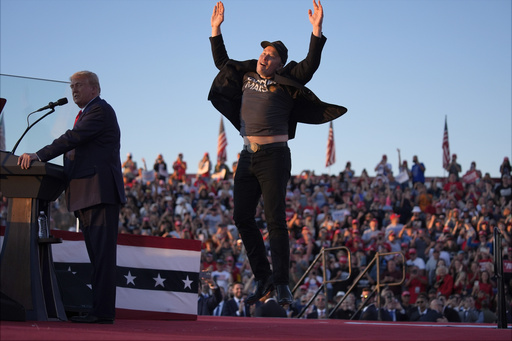WASHINGTON — Dressed in a tuxedo and black tie, Elon Musk confidently addressed attendees at President-elect Donald Trump’s Mar-a-Lago resort shortly after the election. His demeanor reflected the spirit of triumph typically exuded by a winning candidate.
“The public has made its expectations clear – a definitive mandate for change,” Musk declared to an audience comprising Trump’s major donors, campaign executives, and prospective appointees. “We are poised to make significant transformations. This will be a revolution.”
Musk’s close relationship with Trump has forged a connection between the nation’s foremost politician and its wealthiest businessman, with recent polling indicating that public approval ratings for both are closely aligned. Analysts are divided on whether this shared perception will positively or negatively impact Musk’s various enterprises and Trump’s political agenda, but the implications could be substantial in both sectors.
With a net worth exceeding $400 billion, Musk oversees six ventures while collaborating closely with Trump: these include the electric vehicle manufacturer Tesla, the X social media platform, the space exploration company SpaceX, the neural technology firm Neuralink, AI startup xAI, and tunneling company The Boring Co.
“Although there may be a downside, such as potentially alienating customers who are not supporters of Trump, the advantages of being aligned with him in the White House far exceed any drawbacks,” said Dan Ives, an analyst at Wedbush Securities.
Ross Gerber, who runs Gerber Kawasaki Wealth and Investment Management and is a significant investor in Tesla, expressed concern regarding Musk’s dual focus on his businesses and important governmental roles. “As a shareholder, I’m compensating someone who isn’t working for my company full-time,” he remarked. “As a Cybertruck owner grappling with subpar self-driving features, I feel it’s unfair.”
Nonetheless, despite his reservations, Gerber plans to continue investing in Musk’s companies. “I’ve profited greatly thanks to Elon,” he stated. “My investment decisions aren’t influenced by the popularity of a CEO.”
The favorability ratings for Musk closely mirror those of Trump. Data reveals that Musk has no greater support from the public than the new president, with approximately half of Americans holding an unfavorable view of both figures, according to polling data.
Around 40% of individuals express a favorable impression of Musk, correlating closely with similar figures for Trump. Conversely, half of American adults view Musk unfavorably, which again aligns with opinions toward the president.
Political strategist Christine Matthews emphasized that Musk serves as a high-profile endorsement for Trump, bolstering Trump’s image as a successful businessman who has appointed wealthy individuals to prominent advisory roles. “This partnership reinforces the narrative that they are contributing positively to the economy and generating wealth,” Matthews said. “Musk’s reputation as an innovative entrepreneur solidifies this perception.”
Musk also administers X, the platform previously known as Twitter, which he has transformed into a vehicle for advancing conservative viewpoints. Furthermore, his financial support for Trump, including an estimated $250 million during the election, indicates his readiness to challenge GOP members in the 2026 primaries who might stray from Trump’s agenda.
Trump has entrusted Musk with leading initiatives aimed at minimizing the federal government’s reach and curtailing the authority of federal regulatory agencies.
Musk’s firm, Tesla, could significantly benefit from the upcoming Trump administration, especially as it stands to face diminishing competition from smaller manufacturers potentially distanced by reduced subsidies for electric vehicles. Analysts predict that Musk’s status will create an auspicious environment for Tesla in the future. Ives remarked that Musk’s collaboration with Trump could “transform Tesla’s narrative, particularly in areas like AI and robotics.”
Investors are optimistic about Musk’s prospects, viewing his political elevation as a moment of opportunity. Unlike Gerber, Ives anticipates that the discontinuation of electric vehicle subsidies may yield advantages for Tesla by sidelining competitors.
“Wall Street is beginning to recognize the potential benefits stemming from Musk’s role,” Ives noted.
Since Trump’s election, Tesla’s stock has drastically increased, translating to an additional $750 billion in shareholder wealth. Yet, Gerber believes that the rise is primarily due to investor expectations of Tesla leading in autonomous driving, bolstered by the prospect of a national autonomy license under Trump’s administration.
Despite these opinions, he foresees that Tesla may ultimately suffer under certain policies, especially concerning EV tax credits being phased out. “For Tesla, I don’t see substantial advantages emerging from this relationship,” he expressed. “Musk misleads if he claims that eliminating the credit primarily harms competitors.”
Musk’s other ventures, particularly his AI company xAI, could thrive within Trump’s policy framework, according to Gerber. “AI stands to spur significant investment and can raise numerous regulatory issues, especially around matters of safety and information, creating ample opportunities for Musk in this realm,” he elaborated.
The bond between Musk and Trump is unique in American history. David Nasaw, a biographer who has documented significant figures like Andrew Carnegie and William Randolph Hearst, remarked on Musk’s distinct reliance on government support and favorable policies for his companies’ successes, characterizing him as a unique “unicorn.”



